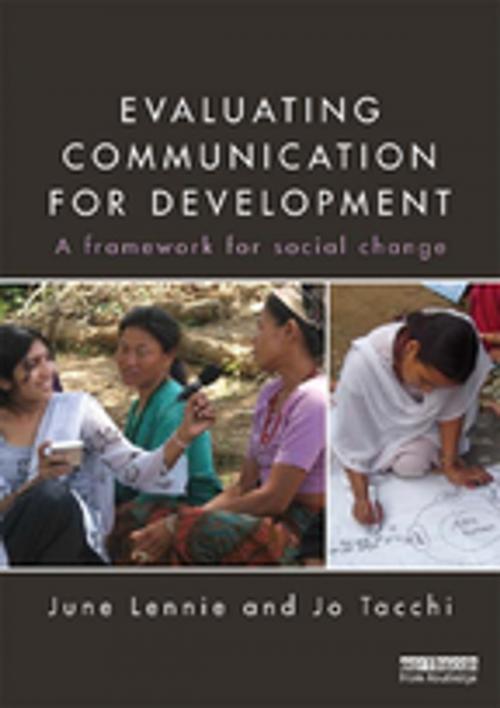Evaluating Communication for Development
A Framework for Social Change
Business & Finance, Economics, Sustainable Development, Economic Development| Author: | June Lennie, Jo Tacchi | ISBN: | 9781136155147 |
| Publisher: | Taylor and Francis | Publication: | February 11, 2013 |
| Imprint: | Routledge | Language: | English |
| Author: | June Lennie, Jo Tacchi |
| ISBN: | 9781136155147 |
| Publisher: | Taylor and Francis |
| Publication: | February 11, 2013 |
| Imprint: | Routledge |
| Language: | English |
Evaluating Communication for Development presents a comprehensive framework for evaluating communication for development (C4D). This framework combines the latest thinking from a number of fields in new ways. It critiques dominant instrumental, accountability-based approaches to development and evaluation and offers an alternative holistic, participatory, mixed methods approach based on systems and complexity thinking and other key concepts. It maintains a focus on power, gender and other differences and social norms. The authors have designed the framework as a way to focus on achieving sustainable social change and to continually improve and develop C4D initiatives. The benefits and rigour of this approach are supported by examples and case studies from a number of action research and evaluation capacity development projects undertaken by the authors over the past fifteen years.
Building on current arguments within the fields of C4D and development, the authors reinforce the case for effective communication being a central and vital component of participatory forms of development, something that needs to be appreciated by decision makers. They also consider ways of increasing the effectiveness of evaluation capacity development from grassroots to management level in the development context, an issue of growing importance to improving the quality, effectiveness and utilisation of monitoring and evaluation studies in this field.
The book includes a critical review of the key approaches, methodologies and methods that are considered effective for planning evaluation, assessing the outcomes of C4D, and engaging in continuous learning. This rigorous book is of immense theoretical and practical value to students, scholars, and professionals researching or working in development, communication and media, applied anthropology, and evaluation and program planning.
Evaluating Communication for Development presents a comprehensive framework for evaluating communication for development (C4D). This framework combines the latest thinking from a number of fields in new ways. It critiques dominant instrumental, accountability-based approaches to development and evaluation and offers an alternative holistic, participatory, mixed methods approach based on systems and complexity thinking and other key concepts. It maintains a focus on power, gender and other differences and social norms. The authors have designed the framework as a way to focus on achieving sustainable social change and to continually improve and develop C4D initiatives. The benefits and rigour of this approach are supported by examples and case studies from a number of action research and evaluation capacity development projects undertaken by the authors over the past fifteen years.
Building on current arguments within the fields of C4D and development, the authors reinforce the case for effective communication being a central and vital component of participatory forms of development, something that needs to be appreciated by decision makers. They also consider ways of increasing the effectiveness of evaluation capacity development from grassroots to management level in the development context, an issue of growing importance to improving the quality, effectiveness and utilisation of monitoring and evaluation studies in this field.
The book includes a critical review of the key approaches, methodologies and methods that are considered effective for planning evaluation, assessing the outcomes of C4D, and engaging in continuous learning. This rigorous book is of immense theoretical and practical value to students, scholars, and professionals researching or working in development, communication and media, applied anthropology, and evaluation and program planning.















